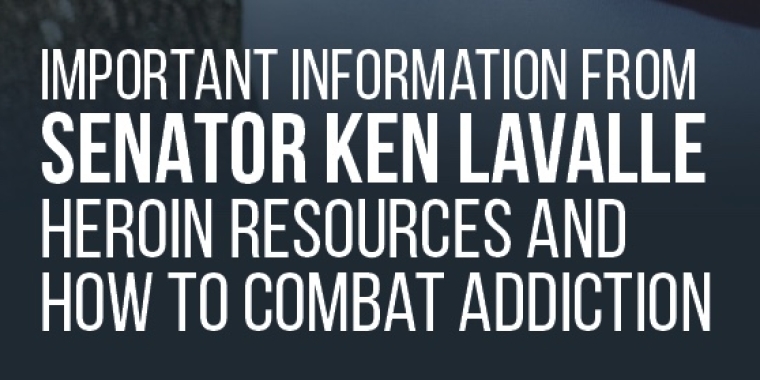
Senator Ken LaValle: Senate Approves Package Of Bills To Fight Heroin And Opioid Abuse
June 17, 2016

June 17, 2016 – Senator Ken LaValle reports that last night the State Senate approved a series of bills to continue the fight against the heroin crisis. The measures focus on addiction prevention, access to treatment, and support for individuals in recovery. The legislation addresses many of the issues raised by the Senate’s Joint Task Force on Heroin and Opioid Addiction over the past few years.
Senator LaValle, a member of the Task Force said, “I have heard from too many funeral directors that they are tired of seeing young faces leave us way to soon. Doctors tell me of seeing too many kids in the emergency rooms. Families have shared their stories of immeasurable grief. The information, experiences and suggestions shared have helped in guiding our efforts.”
He continued: “With the package of bills we just passed; plus those implemented in the budget this year; combined with new laws we added over the past few years, we are making progress in this difficult struggle. I will keep this epidemic my highest priority, as we continue to fight this crisis together.”
The package includes critical new tools to the state’s arsenal to fight the heroin and opioid abuse crisis. The three bills -- S8137, S8138 and S8139 enact a thoughtful, proactive approach to the state’s rapidly evolving heroin and opioid crisis by: expanding insurance coverage for addiction treatment; enhancing treatment options; empowering professionals to administer emergency assistance to individuals; enhancing data collection and reporting on heroin and opioid overdoses; requiring hospitals to educate individuals about available treatment services; requiring prescriber education; and providing insurance coverage for necessary inpatient services for the diagnosis and treatment of substance use disorder.
The Senate’s Joint Task Force on Heroin and Opioid Addiction was created in March 2014 to address the scourge of heroin in New York’s communities. At least 11 bills advanced by the Task Force have already been signed into law and Senate successfully fought to include $189 million in the budget this year to strengthen prevention, treatment, recovery, and education services.
The Task Force released a comprehensive report with more than 30 recommendations in May that would help improve prevention efforts, increase access to treatment, expand recovery options and, provide greater resources to law enforcement to aid in combating this crisis.
Many of the recommendations have been incorporated into the final legislative agreement reached by the Senate, Governor, and Assembly announced earlier this week and passed today. Highlights of the bills include:
Prevention:
Continuing Education on Addiction and Pain Management for All Prescribers: Requires training in pain management, palliative care, and addiction for licensed prescribers. On or before July 1, 2017 and once every three-year period thereafter, prescribers would need to complete three hours of coursework to be developed by the state to increase awareness of the risks presented by prescription opioids.
Educating Consumers About Prescription Abuse and Preventing Blood Borne Diseases: Requires the state Office of Alcohol and Substance Abuse Services (OASAS), in consultation with the state Department of Health (DOH), to create educational materials for pharmacies to distribute to consumers about the dangers of misuse and the potential for addiction to prescription drugs; available treatment resources; and proper disposal. Pharmacists participating in the Expanded Syringe Access Program (ESAP) would also be authorized to counsel customers who are purchasing syringes about preventing injection drug abuse; drug treatment; preventing drug overdose; preventing and treating hepatitis C; testing for HIV; and providing pre-exposure and non-occupational post-exposure prophylaxis.
Limiting Initial Opioid Prescriptions to Seven Days: Addresses the issue of overprescribing medications for acute pain by requiring an authorized practitioner to limit the initial prescription of certain opioids to seven days instead of the current 30 days. A practitioner may then prescribe any appropriate renewal, refill, or new opioid or other prescription after the initial seven-day supply.
Expanding the Reporting of Opioid Overdose Data: Directs DOH to expand its reporting of opioid overdose data by tracking the number of opioid overdoses in addition to the number of opioid overdose deaths. DOH is also required to examine which areas of the state are experiencing high rates of opioid overdoses and if any areas of the state have reduced overdose rates after receiving state resources or services. These vital statistics must be sent to counties each quarter and will provide a greater understanding of the communities struggling most with this crisis to help better allocate funding for prevention, treatment, and recovery services.
Treatment
Ending Prior Insurance Authorization for Immediate Access to Inpatient Treatment Services: Requires up to a minimum of 14 days of coverage for necessary inpatient treatment of substance use disorder (SUD) without prior approval or concurrent utilization review (UR) during those 14 days for in-network providers.
Lengthening the Amount of Time Families Can Seek Emergency Drug Treatment: Extends the amount of time a person can be held to receive emergency services related to substance use from 48 hours to 72 hours. This bill also ensures the provision of adequate discharge planning from treatment facilities, provides individuals with the opportunity to seek further substance use treatment, and requires the dissemination of information on the dangers of long-term substance use and treatment resources.
Allowing More Licensed Professionals to Administer Overdose Reversal Medicine: Provides a limited exemption from professional misconduct to administer an opioid antagonist in an emergency situation by licensed professionals who would otherwise be prohibited from administering drugs.
Expanding Wraparound Services: Requires OASAS to enact the Wraparound Services Demonstration Program created in 2014 to prevent relapses after drug treatments. The program continues to provide services to adolescents and adults for up to nine months after the successful completion of a treatment program. These services would be in the form of case management services that address education, legal, financial, social, childcare, and other supports.
Including Follow-up Treatment Services in Discharge Planning: Requires hospitals to provide referrals for substance use disorder (SUD) patients and to coordinate with SUD services programs and ensure patients are made aware of the availability of treatment programs upon treatment, admission, or discharge. Hospitals will develop and distribute written policies and procedures and train personnel who are in direct clinical contact with SUD patients to identify, assess, and refer such individuals. The bill also requires OASAS, in consultation with DOH, to develop new or utilize existing educational materials for hospitals to distribute to patients who are confirmed to be suffering from SUD or appear to be suffering from SUD.
Expanding Insurance Coverage for Addiction Treatment:
Using Consistent Criteria To Determine the Medical Necessity of Treatments: Allows providers to determine the most appropriate level of care for a client with a substance abuse disorder, regardless of what diagnostic tool is used to determine treatment service levels. Providers could use either OASAS’s Level of Care for Alcohol and Drug Treatment Referral (LOCADTR) or any other diagnostic tool approved by OASAS – increasing the ability of providers to make sure that patients are able to receive the treatment they need.
Authorizing Emergency Substance Use Disorder Medication Coverage: Requires insurance coverage, without prior authorization, for an emergency five-day supply of medications for treating a substance use disorder when emergency conditions exist. Any copayments or coinsurance collected for the emergency supply must not exceed the copayment or coinsurance otherwise applicable to a 30-day supply of such medication
Expanding Access to Naloxone/Opioid Reversal Medication Coverage: Requires insurance coverage for Naloxone or other overdose reversal medication, whether it is prescribed to a person who is addicted to opioids or their family member covered under the same insurance plan.
Removing Prior Authorization Requirements for Buprenorphine and Vivitrol: Eliminates requirements for prior Medicaid authorization for Buprenorphine and Vivitrol prescriptions – drugs that are used in medication-assisted treatment for opioid addiction.
Funding to Combat Heroin and Opioid Abuse:
This year’s budget included $189 million in funding to help address the challenging public health crisis caused by heroin and opioid abuse in communities throughout the state. This includes an increase of $25 million above the Executive Budget proposal that was strongly supported by the members of the Senate’s Joint Task Force on Heroin and Opioid Addiction to help strengthen abuse prevention, treatment, recovery, and education services.
The bills have been transferred to the Assembly for consideration.
###



